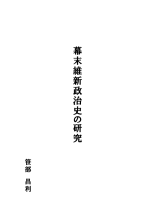14 0 0 0 IR 「人斬り」と幕末政治 : 土佐藩山内家の政治運動と個性
- 著者
- 笹部 昌利
- 出版者
- 佛教大学
- 雑誌
- 鷹陵史学 (ISSN:0386331X)
- 巻号頁・発行日
- vol.31, pp.165-189, 2005-09-24
14 0 0 0 IR 幕末期土佐藩の国事運動と「政治犯」化 : 「御用状」にみえる土佐勤王党への対応を素材に
- 著者
- 笹部 昌利
- 出版者
- 京都産業大学日本文化研究所
- 雑誌
- 京都産業大学日本文化研究所紀要 = THE BULLETIN OF THE INSTITUTE OF JAPANESE CULTURE KYOTO SANGYO UNIVERSITY (ISSN:13417207)
- 巻号頁・発行日
- no.26, pp.23-58, 2021-03-31
本稿は、「土佐藩京都藩邸史料」中の御用状を主な史料として、幕末期の土佐藩、殊に文久二年(一八六二)四月以降、武市半平太ら土佐勤王党により主導された藩外交のありようを、藩当局者が如何に把握し、対応してきたのかを考察するものである。着目したのは、御用状の発給主体である藩政当局の小目付役の意見であり、藩政当局の中間管理的な立場にある役務を担う彼らが、土佐勤王党の政治的浮沈に対し、如何に考え、立ち回らねばならなかったかを明らかにした。
10 0 0 0 IR 幕末期公家の政治意識形成とその転回--三条実美を素材に
- 著者
- 笹部 昌利
- 出版者
- 佛教大学総合研究所
- 雑誌
- 仏教大学総合研究所紀要 (ISSN:13405942)
- 巻号頁・発行日
- no.8, pp.25-44, 2001-03
The theme of this paper is to analyze the contribution of Sanetomi Sanjo (三条実美) towards the growth of political awareness and its subsequent utilization in his political campaign. Sanetsumu Sanjo (三条実万), Sanetomi's father, and Oribe Tomita (富田織部), a feudatory of his family, were his mentors. His growing involvement with political issues led him to interfer with the personal affairs of the Imperial Court, and to request dispatching a "tyokushi" (勅使) delegation to the Tokugawa Shogunate in Bunkyu 2 (1862). In September of Bunkyu 2 (1862), Sanetomi himself was appointed as tyokushi. As a result of this important appointment, his influence gradualry increased and he secured himself the right to speak in the "tyougi" ( 朝議 ) administration meetings. Sanetomi's infuluence was further boosted when he led a special mission requesting "zyoui"(攘夷) to the Tokugawa Shogunate. His involvement led the Imperial court nobles and state daimyos (大名) to recorgnise. Sanetomi as a leader of the "zyoui" campaign. As a result, his authority in Kyoto was entrenched and deepened by the support of the "Choshu-han Mouri family", as they themselves had vested interest in Sanetomi's influence and "zyoui" campaign. In August of Bunkyu 3 (1863), the Mouri family was expelled from the government. As a result, Sanetomi also decided to settle with the Mouri family in Yamaguchi thereby showing symbolicially his identification with Mauri family struggle for political justice. After the Meiji Restoration, Mouri family was given recognition and political justice for their efforts in the "zyoui" campaign. As a result, Sanetomi's contribution was also acknowledge and he was emerged as a radical politician of modern Japan.
10 0 0 0 IR 幕末維新期の「農兵」と軍事動員 : 鳥取藩領の事例を素材に
- 著者
- 笹部 昌利
- 出版者
- 京都産業大学日本文化研究所
- 雑誌
- 京都産業大学日本文化研究所紀要 (ISSN:13417207)
- 巻号頁・発行日
- no.21, pp.21-48, 2015
近世日本における「農兵」とは、疲弊した武家社会を助けるために生じた理念であり、現実性をともなうものではなかった。さらに、それはアヘン戦争の情報によって「海防」意識が高まった十九世紀になっても変わるものではなかった。「農兵」が現実的な存在となってくるのは、ペリー来航以降、外国船への対応が恒常化してからであった。鳥取藩領内においては、文久年間、大名による国事対応が頻繁化し、かつ京・大坂への兵事動員が繁多となったことによって、藩領内の警備の手薄さが再認識され、これへの対応として「農兵」による補填が図られたが、軍事インフラの充実に重きを置いた藩当局の判断により、「農兵」教導は挫折を見た。しかしながらこの折、建設された軍事インフラである台場への対応が、在地社会に委ねられたことは、民衆における軍事への志向性を生み出した。殊に、藩政の中心たる領内東部地域において、その志向性は低調で、領内西部、遠隔地において顕著であった。この民間より動員された兵力は長州戦争における活躍によってその正当性が確認され、鳥取藩内においても、「農兵」教導とあらたな「洋式」軍事編成が模索されるようになった。軽装の洋式「歩兵」は、戊辰戦争において活躍し、その後の調練次第で藩の常備兵化が期待されたが、入隊した兵が抱いた志向は、近世的身分制における褒賞と特権を重視するものであり、そのことが隊内外において混乱を生じさせた。「国民皆兵」主義の実現を目指し、あらたな軍隊の創出を目指す政府は、旧武士層たる士族の特権を否定し、幕末に生成された「農兵」をも否定した。
5 0 0 0 IR 津山藩と幕末政局 : 中央政治と「攘夷」への対応の一形態
- 著者
- 笹部 昌利
- 出版者
- 佛教大学大学院
- 雑誌
- 佛教大學大學院紀要 (ISSN:13442422)
- 巻号頁・発行日
- vol.27, pp.33-47, 1999-03-01
本稿は、薩長土以外の中小諸藩の個別分析が欠如するこれまで明治維新史研究に介在する問題点を明らかにするために、津山松平藩を析出し、同藩の幕末維新期の政治動向を明らかにしようとするものである。特に中央政局と地方(諸藩)の複雑な推移、対立、相互関係など多元的な政治過程のなかから、個別藩における中央への対応形態がどのように精選されていくのか、諸藩の政治運動が活発化する文久期(一八六一-一八六三)において、津山藩が諸藩の動向および攘夷問題に知何に対応していったのかを明らかにし、幕末期における藩の実像に迫る。津山藩攘夷諸藩の政治運動親兵八・一八政変
1 0 0 0 幕末動乱の京都と相国寺
- 著者
- 笹部昌利著 相国寺教化活動委員会編
- 出版者
- 相国寺教化活動委員会
- 巻号頁・発行日
- 2010
1 0 0 0 IR 幕末維新政治史の研究
1 0 0 0 OA 近世中後期上方支配における山城国淀藩の基礎的研究
近世中後期の上方地域支配において、譜代藩である淀稲葉家が果たした役割について、基礎的研究を進めるため、旧藩士家に伝存する古文書を中心に史料調査・収集をおこなった。そのため、淀藩稲葉家および旧藩士家に関する史料の全体像把握をおこなうとともに、新たに旧淀藩士の上月家文書2180点、高野瀬家文書257点、竹林家文書257点の調査と全史料の目録化をおこなった。これらの成果により、藩政機構の基礎構造、家臣団の軍制・家格・職制の関係分析をおこない、淀藩の負担する京都火消・京都警衛などの幕府軍役の実態などを明らかにした。
1 0 0 0 OA 近世の朝廷と賀茂に関する史料(御記・絵巻等)の研究と活用
- 著者
- 所 功 川北 靖之 黒住 祥祐 小林 一彦 宮川 康子 若松 正志 海野 圭介 山口 剛史 飯塚 ひろみ 石田 俊 今江 廣道 宇野 日出生 岸本 香織 京條 寛樹 久世 奈欧 (野村 奈欧) 嵯峨井 建 笹部 昌利 篠田 孝一 宍戸 忠男 末松 剛 土橋 誠 橋本 富太郎 松本 公一 村山 弘太郎 山本 宗尚 吉野 健一 米田 裕之 若杉 準治
- 出版者
- 京都産業大学
- 雑誌
- 基盤研究(C)
- 巻号頁・発行日
- 2009
近世(江戸時代)の賀茂大社(上賀茂・下鴨両社)では、世襲の社家神職たちにより、朝廷と幕府の支援をえて、葵祭や社務が運営されてきた。私共は、その実情を伝える社家の記録や祭礼の絵巻などを、朝廷の御記や公家の日記などと照合しながら、相互関係の解明に努めた。その成果は、本学日本文化研究所の紀要や所報などに発表し、また本学図書館所蔵の賀茂関係絵巻などは大半をデジタル化し詞書(ことばがき)の解読も加えて貴重書アーカイブスに公開している。
